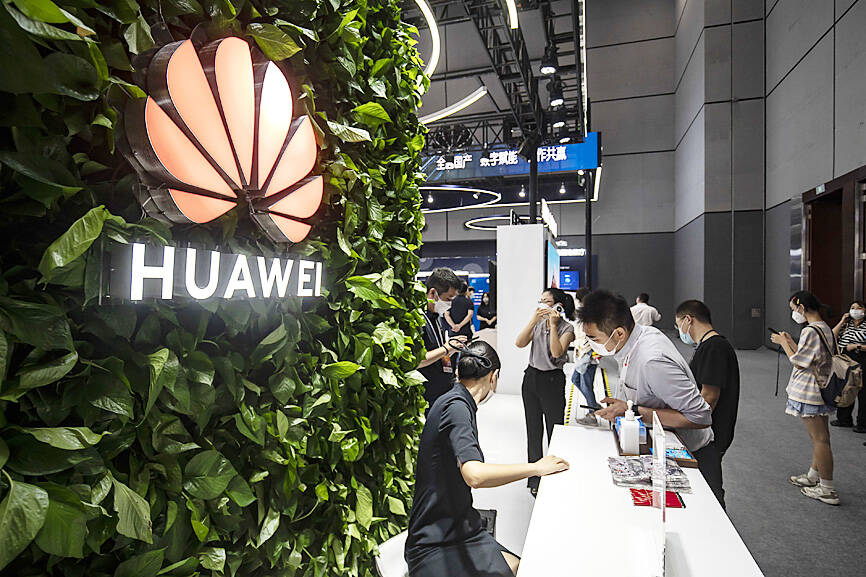Huawei Technologies Co (華為) posted its third straight quarter of growth, declaring a return to normalcy after overcoming a plethora of US restrictions this year.
Huawei’s sales rose 7.2 percent to 191 billion yuan (US$27.47 billion) in the quarter ending this month, after carving out new income streams from areas such as smart vehicles and cloud services, company data showed.
Last year’s sales stood at 636.9 billion yuan, the Shenzhen-based company said, up marginally from a year earlier.

Photo: Bloomberg
Huawei is trying to open up new markets and businesses after US tech export restrictions gutted its smartphone business — briefly the world’s largest — and curtailed the sale of advanced gear in developed markets. Among those trade restrictions is a ban on contract chipmakers producing semiconductors designed by Huawei, crippling its HiSilicon design business.
Huawei rotating chairman Eric Xu (徐直軍) in a new year’s message to employees warned of macroeconomic uncertainty next year.
However, Xu said longer-term demand for technology remains intact. He did not specify how the company might overcome export restrictions, but Huawei has spent much of the past three years developing, researching and sourcing alternatives to US components.
“In 2022, we successfully pulled ourselves out of crisis mode. US restrictions are now our new normal, and we’re back to business as usual,” Xu said.
“The macro environment may be rife with uncertainty, but what we can be certain about is that digitalization and decarbonization are the way forward, and they’re where future opportunities lie,” he added.
Huawei has also sought out alternative sources of income by selling patents, technology services and wireless gear to new customers ranging from automakers to coal mines and industrial parks. It levies royalties from the world’s largest smartphone brands, including Apple Inc and Samsung Electronics Co.
The company has signed more than 20 patent license agreements this year, Huawei global head of IP Alan Fan (樊志勇) said.
“We’ve managed to keep our heads above the water because we fought together,” Xu wrote. “2023 will be the first year that we return to business as usual with external restrictions still in place.”

Micron Memory Taiwan Co (台灣美光), a subsidiary of US memorychip maker Micron Technology Inc, has been granted a NT$4.7 billion (US$149.5 million) subsidy under the Ministry of Economic Affairs A+ Corporate Innovation and R&D Enhancement program, the ministry said yesterday. The US memorychip maker’s program aims to back the development of high-performance and high-bandwidth memory chips with a total budget of NT$11.75 billion, the ministry said. Aside from the government funding, Micron is to inject the remaining investment of NT$7.06 billion as the company applied to participate the government’s Global Innovation Partnership Program to deepen technology cooperation, a ministry official told the

Taiwan Semiconductor Manufacturing Co (TSMC, 台積電), the world’s leading advanced chipmaker, officially began volume production of its 2-nanometer chips in the fourth quarter of this year, according to a recent update on the company’s Web site. The low-key announcement confirms that TSMC, the go-to chipmaker for artificial intelligence (AI) hardware providers Nvidia Corp and iPhone maker Apple Inc, met its original roadmap for the next-generation technology. Production is currently centered at Fab 22 in Kaohsiung, utilizing the company’s first-generation nanosheet transistor technology. The new architecture achieves “full-node strides in performance and power consumption,” TSMC said. The company described the 2nm process as

Shares in Taiwan closed at a new high yesterday, the first trading day of the new year, as contract chipmaker Taiwan Semiconductor Manufacturing Co (TSMC, 台積電) continued to break records amid an artificial intelligence (AI) boom, dealers said. The TAIEX closed up 386.21 points, or 1.33 percent, at 29,349.81, with turnover totaling NT$648.844 billion (US$20.65 billion). “Judging from a stronger Taiwan dollar against the US dollar, I think foreign institutional investors returned from the holidays and brought funds into the local market,” Concord Securities Co (康和證券) analyst Kerry Huang (黃志祺) said. “Foreign investors just rebuilt their positions with TSMC as their top target,

POTENTIAL demand: Tesla’s chance of reclaiming its leadership in EVs seems uncertain, but breakthrough in full self-driving could help boost sales, an analyst said Chinese auto giant BYD Co (比亞迪) is poised to surpass Tesla Inc as the world’s biggest electric vehicle (EV) company in annual sales. The two groups are expected to soon publish their final figures for this year, and based on sales data so far this year, there is almost no chance the US company led by CEO Elon Musk would retain its leadership position. As of the end of last month, BYD, which also produces hybrid vehicles, had sold 2.07 million EVs. Tesla, for its part, had sold 1.22 million by the end of September. Tesla’s September figures included a one-time boost in